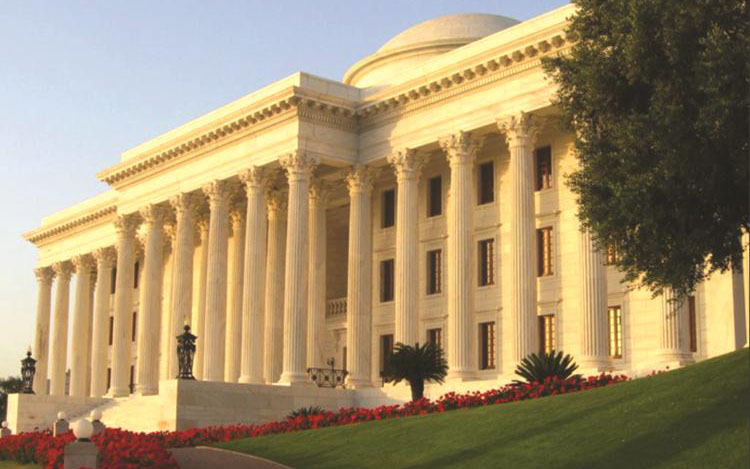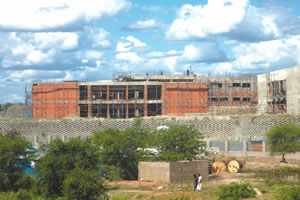Joyous celebrations to mark Bahá’í new year


The Bahá’í World Centre — The Seat of the Universal House of Justice is the home of the Baha’i Faith’s international governing body, Haifa, Israel. The Seat is flanked on the left by The Seat of the International Teaching Centre, on the right by the Centre for the Study of the Sacred Texts, and, in the foreground, by the International Archives Building
Flora Teckie
The Baha’i New Year festival known as Naw-Ruz (literally “New Day”) is held on the first day of spring (spring equinox), but the celebrations begin the evening before, because the Baha’i day begins at sunset.
New Year celebrations vary from community to community. The event planned for Harare is typical of the kind of multi-cultural celebrations that will be observed in many of the 116 000 localities around the world, where Baha’is – who embrace human diversity – reside. The programme will include prayers and reading of Baha’i Scriptures in different languages, and also music.
Naw-Ruz is celebrated by the Bahá’ís as the annual festival of the spiritual and physical springtime. Spring is the time of freshness and renewal in nature. It is also symbolic of the periodic renewal of the religion of God – the coming of the spiritual spring.
As stated in the Bahá’í Writings: “At the time of the vernal equinox in the material world a wonderful vibrant energy and new life-quickening is observed everywhere in the vegetable kingdom; the animal and human kingdoms are resuscitated and move forward with a new impulse. The whole world is born anew, resurrected. Gentle zephyrs are set in motion, wafting and fragrant; flowers bloom; the trees are in blossom, the air temperate and delightful; how pleasant and beautiful become the mountains, fields and meadows.
Likewise, the spiritual bounty and springtime of God quicken the world of humanity with a new animus and vivification. All the virtues which have been deposited and potential in human hearts are being revealed from that Reality as flowers and blossoms from divine gardens. It is a day of joy, a time of happiness, a period of spiritual growth”.
Bahá’í calendar is based on the solar year
The Bahá’í Faith has its own sacred scriptures, laws, calendar, and holy days. The Bahá’í calendar is based on the solar year. It begins on March Equinox and is divided into 19 months of 19 days each month. Four intercalary days are added (and in the leap years a fifth day) to make up the year. The months are named after some of the attributes of God such as might, glory and grandeur.
The Bahá’í calendar dates its years from 1844, which marks the beginning of the Bahá’í Era. This year is 174 BE (Bahá’í Era). Naw-Ruz is the first day of the first of 19 months in the Bahá’í calendar.
Naw-Rúz is one of the nine Bahá’í holy days on which work is suspended. The festival comes at the end of a 19-day fast in which Baha’is abstain from food and drink between sunrise and sunset as a reminder of the need for individuals to be detached from their material desires.
The Bahá’í Faith is today amongst the fastest growing religions. With followers in at least 233 countries and dependent territories, it embraces a cross section of the human race and has become the world’s second-most widespread religion in its geographic reach, according to the Encyclopaedia Britannica.
Its founder, Bahá’u’lláh, teaches that there is only one God, that there is only one human race, and that all the world religions have been stages in the revelation of God’s purpose for humankind. As Bahá’u’lláh wrote: “ . . . the peoples of the world, of whatever race or religion, derive their inspiration from one heavenly Source, and are the subjects of one God”.
200th anniversary of the birth of Bahá’u’lláh
Bahá’u’lláh was born on November 12, 1817. The Harare Bahá’í community is happy to join with others around the world, who are preparing to celebrate and honour the 200th anniversary of His birth.
Bahá’u’lláh’s wrote over a 100 volumes – which form the core of the sacred Scripture of the Bahá’í Faith. The original texts, many of them in Bahá’u’lláh’s own hand, others dictated and affirmed by Him, have been meticulously preserved. From his words, the worldwide Bahá’í community draws its inspiration, discovers its moral bearing and derives creative energy.
In His writings, Bahá’u’lláh outlined a framework for the reconstruction of human society at all levels. His writings cover a vast range of subjects from social issues such as the oneness of humanity, racial integration, the equality of the sexes, and disarmament, to those questions that affect the innermost life of the human soul.
The principle of the oneness of humankind is “the pivot round which all the teachings of Bahá’u’lláh revolve”. The belief and conviction that we all belong to one human family is at the heart of the Bahá’í Faith.
The unity of humanity, as Bahá’ís view it, is a unity in diversity rather than uniformity. “The diversity in the human family,” according to the Bahá’í Writings, “ . . . should be the cause of love and harmony, as it is in music where many different notes blend together in the making of a perfect chord”. Further emphasising this point the Bahá’í Writings state: “If you meet those of different race and colour from yourself, do not mistrust them and withdraw yourself into your shell of conventionality, but rather be glad and show them kindness. Think of them as different coloured roses growing in the beautiful garden of humanity, and rejoice to be among them”.
It is the Bahá’í view that, our peace and security are closely linked to our unity as humanity. As Bahá’u’lláh asserts: “The well-being of mankind, its peace and security, are unattainable unless and until its unity is firmly established” and “So powerful is the light of unity,” is His further testimony, “that it can illuminate the whole earth,” that “The earth is but one country and mankind its citizens”.
Bahá’í beliefs also address such essential themes as the oneness of all major world religions, freedom from all types of prejudice and the inherent nobility of the human being. It also addresses the progressive revelation of religious truth, the crucial need for development of spiritual qualities, the importance of integrating worship and service, and the fundamental equality of the men and women.
Bahá’í beliefs also address the harmony between religion and science, the centrality of justice to all human endeavours, the importance of universal education, and the dynamics of the relationships that are to bind together individuals, communities, and institutions as humanity advances towards its collective maturity.
The worldwide Baha’i community, composed of people from virtually every background, is working to give practical expression to Bahá’u’lláh’s vision of a peaceful and prosperous world; and welcomes everyone to join them in a united effort of building a divine civilization.
- For feedback please contact: [email protected] or [email protected] Website: www.bahai.org










Comments